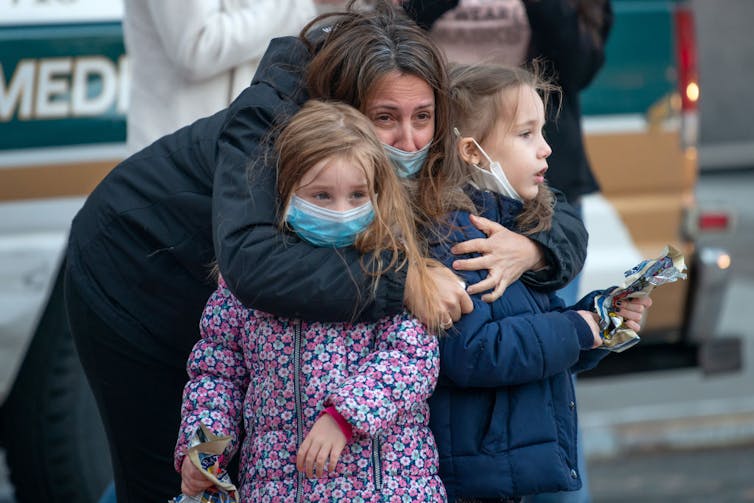5 strategies for cultivating hope this year
- Written by Jacqueline S. Mattis, Dean of Faculty, Rutgers University - Newark
The raging coronavirus pandemic, along with political turbulence and uncertainty, have overwhelmed many of us.
From almost the start of 2020, people have been faced with bleak prospects as illness, death[1], isolation and job losses became unwelcome parts of our reality. On Wednesday, many of us watched in horror and despair as insurgents stormed the U.S. Capitol[2].
Indeed, all through these times, both the dark and bright sides of human nature were evident as many people engaged in extraordinary compassion[3] and courage when others were committing acts of violence[4], self-interest or greed[5].
As a research scientist whose work focuses on positive psychology[6] among people facing challenges, I am deeply aware that if ever there were a time for a conversation about hope, it is now.
Hope vs. optimism
First, let’s understand what hope is. Many people confuse optimism with hope.
Charles R. Snyder[7], author of “The Psychology of Hope[8],” defined hope as the tendency to see desired goals as possible, and to approach those goals with “agency thinking,” a belief that you or others have the ability to achieve the goals. He also defined hope as “pathways thinking,” a focus on mapping routes and plans to achieve those goals.
Optimism is different[9]. Psychologist Charles Carver[10] defines optimism[11] as a general expectation that good things will happen in the future. Optimists tend to seek out the positive and, at times, deny or avoid negative information. In sum, optimism is about expecting good things; hope is about how we plan and act to achieve what we want.
Here are five key strategies to cultivate hope in these trying times:
1. Do something – start with goals
Hopeful people do not wish – they imagine and act. They establish clear, achievable goals[12] and make a clear plan. They believe in their agency – that is, their capacity to achieve the outcomes. They recognize that their path will be marked by stresses, roadblocks and failure. According to psychologists such as Snyder and others[13], people who are hopeful are able to “anticipate these barriers” and they “choose” the right “pathways.”
 Hopeful people imagine and act.
Alexi Rosenfeld/Getty Images Entertainment[14]
Hopeful people imagine and act.
Alexi Rosenfeld/Getty Images Entertainment[14]
Further, hopeful people adapt[15]. When their hopes are thwarted, they tend to become more focused on doing things to achieve their goals.
As psychologist Eddie Tong[16] writes[17], “hopeful people tend to think that desired goals are attainable even if personal resources are exhausted.” In other words, people of hope persist even when prospects may not be so favorable.
Importantly, evidence suggests that the belief that one is capable[18] of achieving one’s goals may be more important for hope than knowing how to achieve those goals.
2. Harness the power of uncertainty
Several researchers[19] have argued that, for hope to arise, individuals need to be able to perceive the “possibility of success.”
Research shows that many of life’s uncertainties could help people cultivate hope in difficult times. For example, a 2017 study[20] showed that parents of children diagnosed with multiple sclerosis used the fact that so little is known about the condition in childhood to fuel and sustain their sense of hope. Parents reasoned that since it is so hard to accurately diagnose childhood multiple sclerosis and prognosis is so varied, there was a chance that their children were misdiagnosed and they could recover and live normal lives.
In sum, a future that is uncertain holds lots of possibilities. As such, uncertainty is not reason for paralysis – it is a reason to hope.
3. Manage your attention
Hopeful and optimistic people show similarities and differences in the kinds of emotional stimuli they pay attention to in the world.
For example, psychologist[21] Lucas Kelberer and his colleagues[22] found that optimists tended to seek out positive images, such as that of happy people[23], and avoid images of people who seem depressed.
Hopeful people did not necessarily seek out emotionally positive information. However, people high on hope spent less time paying attention to emotionally sad or threatening information[24].
In a world in which we are overwhelmed with options for what we read, watch and listen to, maintaining hope may not require us to go after positive information, but it does require that we avoid negative images and messages.
4. Seek community. Don’t go it alone
Hope is hard to sustain in isolation. Research demonstrates that for people working to bring social change, particularly anti-poverty activists, relationships and community[25] provided the reason for hope and ignited their conviction to keep fighting.
Connection to others allowed activists to feel a sense of accountability, to recognize that their work mattered and that they were part of something bigger than themselves.
Relationships are important, but health research also suggests that sustaining hope depends, in part, on the particular company we keep. For example, parents of chronically ill children often maintained hope by withdrawing from or avoiding interactions[26] with negative people who challenged their efforts to seek positive ends. We can stay hopeful if we connect with others who hold us accountable and remind us of why our struggles matter.
5. Look at the evidence
 Cultivating hope can require trust and examining evidence from our lives.
Marwan Tahtah/Getty Images[27]
Cultivating hope can require trust and examining evidence from our lives.
Marwan Tahtah/Getty Images[27]
Hope also requires trust. Hopeful people stake their trust in data, particularly in the evidence of history[28]. Research demonstrates, for example, that anti-poverty activists drew hope from knowing that, historically, when people joined together in resistance they were able to create change.
Cultivating and sustaining hope, then, requires that we gather evidence from our own lives, history and the world at large and use that evidence to guide our plans, pathways and actions.
Hope also requires that we learn to use this data to effectively calibrate progress – no matter how small.
References
- ^ illness, death (news.abs-cbn.com)
- ^ insurgents stormed the U.S. Capitol (www.nytimes.com)
- ^ extraordinary compassion (greatergood.berkeley.edu)
- ^ committing acts of violence (www.washingtonpost.com)
- ^ self-interest or greed (carey.jhu.edu)
- ^ positive psychology (link.springer.com)
- ^ Charles R. Snyder (www.oxfordhandbooks.com)
- ^ The Psychology of Hope (books.google.com)
- ^ Optimism is different (bit.ly)
- ^ Charles Carver (www.psychologicalscience.org)
- ^ optimism (doi.org)
- ^ clear, achievable goals (www.jstor.org)
- ^ psychologists such as Snyder and others (doi.org)
- ^ Alexi Rosenfeld/Getty Images Entertainment (www.gettyimages.com)
- ^ adapt (doi.org)
- ^ Eddie Tong (www.ippaworldcongress.org)
- ^ writes (doi.org)
- ^ belief that one is capable (doi.org)
- ^ Several researchers (link.springer.com)
- ^ 2017 study (doi.org)
- ^ psychologist (www.researchgate.net)
- ^ Lucas Kelberer and his colleagues (doi.org)
- ^ optimists tended to seek out positive images, such as that of happy people (doi.org)
- ^ sad or threatening information (doi.org)
- ^ relationships and community (www.jstor.org)
- ^ avoiding interactions (doi.org)
- ^ Marwan Tahtah/Getty Images (www.gettyimages.com)
- ^ evidence of history (www.jstor.org)
Authors: Jacqueline S. Mattis, Dean of Faculty, Rutgers University - Newark
Read more https://theconversation.com/5-strategies-for-cultivating-hope-this-year-152523

